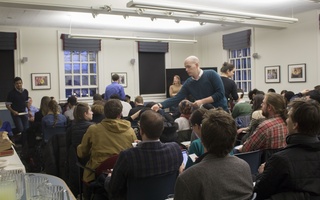{shortcode-e34a5ae3fc5bc753e7015980383e3f4c9e372d66}Harvard and its new graduate student union will face each other across the bargaining table for the first time Monday, University Provost Alan M. Garber ’77 announced in an email to Harvard affiliates Friday afternoon.
The opening session marks the culmination of a years-long push by Harvard’s graduate students to negotiate their own wages and benefits with the University. In 2015, The Crimson reported that a small group of students had begun organizing behind closed doors to form a union on campus. That push took off rapidly, culminating in two contentious unionization elections over the past two years.
The first saw more students vote against unionization than for — but, on April 18 and 19, 2018, the results of the second of those elections fell firmly in favor of Harvard Graduate Students Union-United Automobile Workers. The University announced its intention to bargain with HSGU-UAW 11 days later, ensuring the official installment of a graduate student union on campus for the first time in Harvard history.
Both the University and the union have spent the intervening months preparing to bargain.
The union formed a 13-member bargaining team whose members surveyed HGSU-UAW’s membership and produced a list of bargaining goals. Kenneth Lang, a United Automobile Workers organizer, is advising the committee. Lang came to Harvard from Columbia, where graduate students are currently considering a second strike in a bid to force administrators to negotiate.
The University’s bargaining team includes several faculty members, outside legal counsel and representatives from the Provost’s Office, the Office of Labor and Employee Relations, Financial Administration, the General Counsel’s Office, and the Graduate School of Arts and Sciences, according to Paul Curran, director of labor relations and employee relations.
In his email, Garber outlined key positions University administrators plan to take during negotiations. Chief among them is maintaining a strong dividing line between issues related to labor and issues related to academics. Which issues are open for negotiation may become a point of contention in the coming months as HGSU-UAW members argue for expansive contract proposals drawn from their initial 80-item list of bargaining goals.
“Because there is so little legal precedent involving a student union at a private university, the boundaries between terms and conditions of employment and issues of involving academic activity are not clear,” Garber wrote. “I also want to emphasize that, throughout this process, our responsibility is first and foremost to provide the best possible education to all students and to meeting our fundamental commitments as an academic institution.”
“We are not under any obligation to negotiate with the United Auto Workers about academic matters, and will not do so. We will not agree to terms that will compromise our educational mission,” he added.
Garber also wrote that the University anticipates the bargaining process will be lengthy, as is typical of a fledgling union’s first contract negotiations.
“Initial collective bargaining agreements are inherently time-consuming, and this will be especially true for a bargaining unit of this size and heterogeneity,” Garber wrote.
In anticipation of the first hours of bargaining, HGSU-UAW plans to rally in Harvard Yard on Monday morning before the session starts. The event, titled “Bargain Fest" on social media, will feature “signs, Solidarity Cider, and lots of festive cheer,” according to an HGSU-UAW Facebook event.
—Staff writer Shera S. Avi-Yonah can be reached at shera.avi-yonah@thecrimson.com. Follow her on Twitter at @saviyonah.
—Staff writer Molly C. McCafferty can be reached at molly.mccafferty@thecrimson.com. Follow her on Twitter at @mollmccaff.















